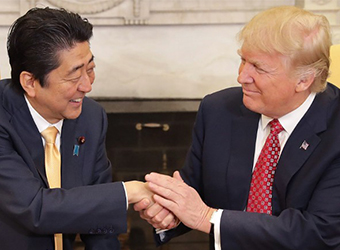Japanese Prime Minister Shinzo Abe spoke with U.S. President Donald Trump on Monday and agreed on the need for more action on North Korea just hours after the U.S. Ambassador to the United Nations said Washington is “done talking about North Korea”.
Nikki Haley, U.S. Ambassador to the United Nations, said in a statement China must decide if it is willing to back imposing stronger U.N. sanctions on North Korea over Friday night’s long-range missile test, the North’s second this month.
Any new U.N. Security Council resolution “that does not significantly increase the international pressure on North Korea is of no value”, Haley said, adding that Japan and South Korea also needed to do more.
Abe told reporters after his conversation with Trump that repeated efforts by the international community to find a peaceful solution to the North Korean issue had yet to bear fruit in the face of Pyongyang’s unilateral “escalation”.
“International society, including Russia and China, need to take this seriously and increase pressure,” Abe said. He said Japan and the United States would take steps toward concrete action but did not give details. Abe and Trump did not discuss military action against North Korea, nor what would constitute the crossing of a “red line” by Pyongyang, Deputy Chief Cabinet spokesman Koichi Hagiuda told reporters.
Abe and Trump did not discuss military action against North Korea, nor what would constitute the crossing of a “red line” by Pyongyang, Deputy Chief Cabinet spokesman Koichi Hagiuda told reporters.
A White House statement after the phone call said the two leaders “agreed that North Korea poses a grave and growing direct threat to the United States, Japan, the Republic of Korea, and other countries near and far”.
It said Trump “reaffirmed our ironclad commitment” to defend Japan and South Korea from any attack, “using the full range of United States capabilities”.
Japan’s Chief Cabinet Secretary Yoshihide Suga said the talk between Abe and Trump lasted for about 50 minutes.
“The role that China can play is extremely important,” he told a news conference.
“Japan intends to call on those countries involved – including the U.N., the United States and South Korea to start, but also China and Russia – to take on additional duties and actions to increase pressure,” Suga said, declining to give details about what those steps might be.
North Korea said on Saturday it had conducted another successful test of an intercontinental ballistic missile that proved its ability to strike the U.S. mainland, drawing a sharp warning from Trump and a rebuke from China.
Trump later wrote on Twitter that he was “very disappointed” in China and that Beijing profits from U.S. trade but had done “nothing” for the United States with regards to North Korea, something he would not allow to continue.
Chinese Vice Commerce Minister Qian Keming, asked at a news conference in Beijing about Trump’s tweets, said there was no link between the North Korea issue and China-U.S. trade.
“We think the North Korea nuclear issue and China-US trade are issues that are in two completely different domains. They aren’t related. They should not be discussed together,” Qian said.
State-run Chinese tabloid the Global Times said in an editorial on Monday Trump’s “wrong tweet” was of no help, and that Trump did not understand the issues.
“Pyongyang is determined to develop its nuclear and missile program and does not care about military threats from the U.S. and South Korea. How could Chinese sanctions change the situation?” said the paper, which is published by the ruling Communist Party’s official People’s Daily.
China wants both balanced trade with the United States and lasting peace on the Korean peninsula, its official Xinhua news agency added in a commentary.
“However, to realize these goals, Beijing needs a more cooperative partner in the White House, not one who piles blame on China for the United States’ failures,” it added.
South Korean President Moon Jae-in, who is on vacation, planned to have a phone call with Trump soon, a senior official at the Presidential Blue House said.
“If the two heads of state talk, they will likely discuss their respective stances on North Korea, the U.S.-(South Korea) alliance’s standpoint on North Korea and other things including how to impose heavy sanctions,” the official said.
The United States flew two supersonic B-1B bombers over the Korean peninsula in a show of force on Sunday in response to the missile test and the July 3 launch of the “Hwasong-14” rocket, the Pentagon said. The bombers took off from a U.S. air base in Guam and were joined by Japanese and South Korean fighter jets during the exercise.
“North Korea remains the most urgent threat to regional stability,” Pacific Air Forces commander General Terrence J. O’Shaughnessy said in a statement.
“If called upon, we are ready to respond with rapid, lethal, and overwhelming force at a time and place of our choosing.”
Source: Reuters


